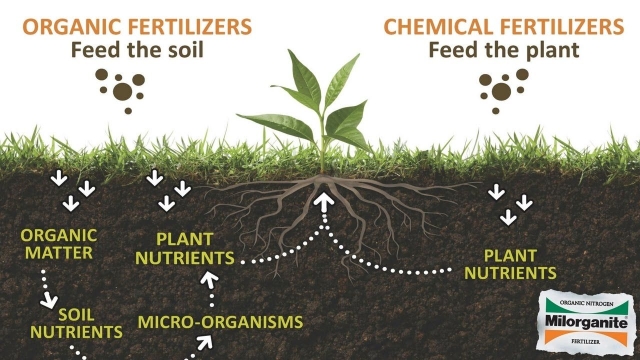
The Natural Way: Harnessing the Power of Organic Soils and Fertilizers
Organic soils and fertilizers have gained significant attention in recent years as more people seek sustainable and eco-friendly farming methods. These natural alternatives offer a multitude of benefits, not only for the environment but also for the health and quality of the crops grown. By shifting away from synthetic chemicals and embracing organic soils and fertilizers, farmers and gardeners alike can tap into the inherent power of nature to enhance plant growth and soil health.
One of the key advantages of organic soils is their ability to promote nutrient-rich environments for plants. Unlike conventional soils, which may be depleted of essential elements due to repeated use and chemical fertilizers, organic soils are enriched naturally through the decomposition of organic matter. This gradual breakdown releases nutrients such as nitrogen, phosphorus, and potassium, which are essential for plant growth. As a result, crops grown in organic soils often display improved vitality and resilience.
In addition to providing essential nutrients, organic soils also promote optimal soil structure and composition. The rich organic matter helps to increase soil porosity, allowing for better water infiltration and retention. This not only reduces the risk of erosion but also improves the overall soil quality, making it more conducive to root development and nutrient absorption. As organic matter decomposes, it also enhances the soil’s ability to hold moisture, reducing the need for excessive irrigation and water wastage.
When it comes to fertilizers, organic options offer a natural alternative to chemical-based products. Organic fertilizers are derived from a variety of sources, such as compost, manure, or plant-based materials. These natural substances contain a broad spectrum of nutrients that can be gradually released into the soil, providing long-term nourishment for plants. This slow-release mechanism ensures a steady supply of nutrients over time, effectively minimizing the risk of nutrient leaching and runoff, which can pollute water sources.
By harnessing the power of organic soils and fertilizers, farmers and gardeners can create a harmonious balance between cultivation and conservation. The use of natural alternatives not only enhances crop productivity but also safeguards the environment, promoting biodiversity and minimizing the impact on ecosystems. With an increasing focus on sustainability, it is clear that organic soils and fertilizers are paving the way for a healthier and greener future in agriculture.
Benefits of Organic Soils
Organic soils have numerous benefits that make them a popular choice for gardeners and farmers alike. These soils are enriched with natural nutrients and promote healthy plant growth. By harnessing the power of organic soils, you can expect to experience the following advantages:
Enhanced Nutrient Content: Organic soils are enriched with a wide range of essential nutrients that plants need to thrive. These nutrients are derived from natural sources, such as decomposed plant matter and animal waste, which provide a balanced and sustainable nutrient supply for your plants.

Improved Soil Structure: Organic soils have a crumbly and well-aerated texture that allows for optimal root penetration and growth. This improved soil structure also helps with water retention and drainage, preventing soil erosion and waterlogging issues.
Increased Soil Fertility: By using organic soils, you can enhance the overall fertility of your soil. Organic matter acts as a natural fertilizer, releasing nutrients slowly over time and stimulating beneficial microbial activity. This creates a healthy soil ecosystem that supports the growth of plants and improves nutrient uptake.
when harvest onions
In summary, organic soils offer a host of benefits, including enhanced nutrient content, improved soil structure, and increased soil fertility. By harnessing the power of these soils, you can create an optimal environment for your plants to grow and thrive naturally.
Choosing the Right Organic Fertilizer
When it comes to organic gardening, selecting the appropriate organic fertilizer is crucial for the health and vitality of your plants. With the wide range of options available, it is essential to understand the specific needs of your garden and crops in order to make the right choice.
Know your soil: Before choosing an organic fertilizer, it is important to have a good understanding of your soil’s composition and nutrient levels. Conducting a soil test can provide valuable insights into the pH balance, texture, and nutrient deficiencies that may exist. Armed with this knowledge, you can then select a fertilizer that addresses these specific needs.
Consider the NPK ratio: The NPK ratio refers to the relative proportions of nitrogen (N), phosphorus (P), and potassium (K) in a fertilizer. Each of these nutrients plays a vital role in plant growth and development. Understanding the specific requirements of your crops can help you choose a fertilizer with the appropriate NPK ratio. For instance, leafy greens typically require higher nitrogen levels, while flowering plants may benefit from a higher phosphorus content.
Research organic options: Organic fertilizers come in various forms, including compost, manure, and plant-based materials. Take the time to research different organic options and their benefits. Compost, for example, improves soil structure and moisture retention, while manure provides essential nutrients. By exploring the advantages of each organic fertilizer, you can select the one that aligns best with your gardening goals.
By keeping these factors in mind and understanding the unique requirements of your garden, you can make an informed decision when it comes to choosing the right organic fertilizer. Remember, a well-nourished soil will result in healthier plants and a bountiful harvest.
Best Practices for Using Organic Soils and Fertilizers
When it comes to utilizing organic soils and fertilizers effectively, there are several best practices to keep in mind. By following these guidelines, you can maximize the benefits of organic gardening and promote the health and vitality of your plants.
Understand Soil Composition:
Before applying organic fertilizers or amending the soil, it is crucial to have a clear understanding of your soil composition. Conducting a soil test can provide you with valuable insights into its pH levels, nutrient content, and organic matter. This information will help you determine the right type and amount of organic amendments and fertilizers to use.Choose the Right Organic Soil Amendments:
Selecting the appropriate organic soil amendments is essential for improving soil fertility. Compost, aged manure, and leaf mold are popular choices that add essential nutrients and enhance soil structure. Additionally, incorporating cover crops, such as legumes or grasses, can help fix nitrogen levels naturally and increase organic matter over time.Apply Organic Fertilizers Judiciously:
Organic fertilizers provide nutrients to plants in a slow-release manner, promoting long-term growth and reducing the risk of nutrient runoff. It is important to read the instructions on the fertilizer packaging and apply them in the recommended amounts. Over-fertilization can lead to nutrient imbalances and may harm plants, so be mindful of not exceeding the recommended dosage.
By adhering to these best practices, you can harness the power of organic soils and fertilizers, creating a sustainable and thriving garden environment. Remember to continually monitor your plants’ progress and make adjustments accordingly to optimize their growth with organic gardening methods.

